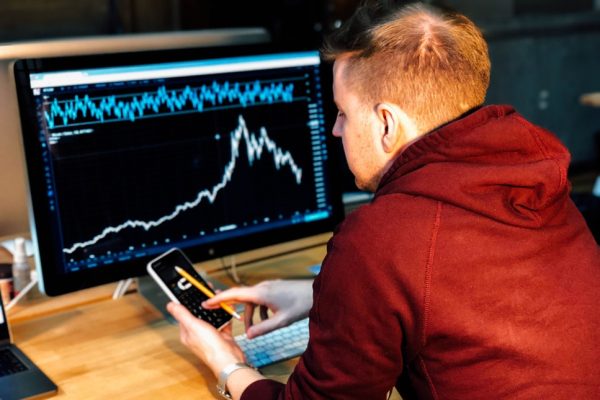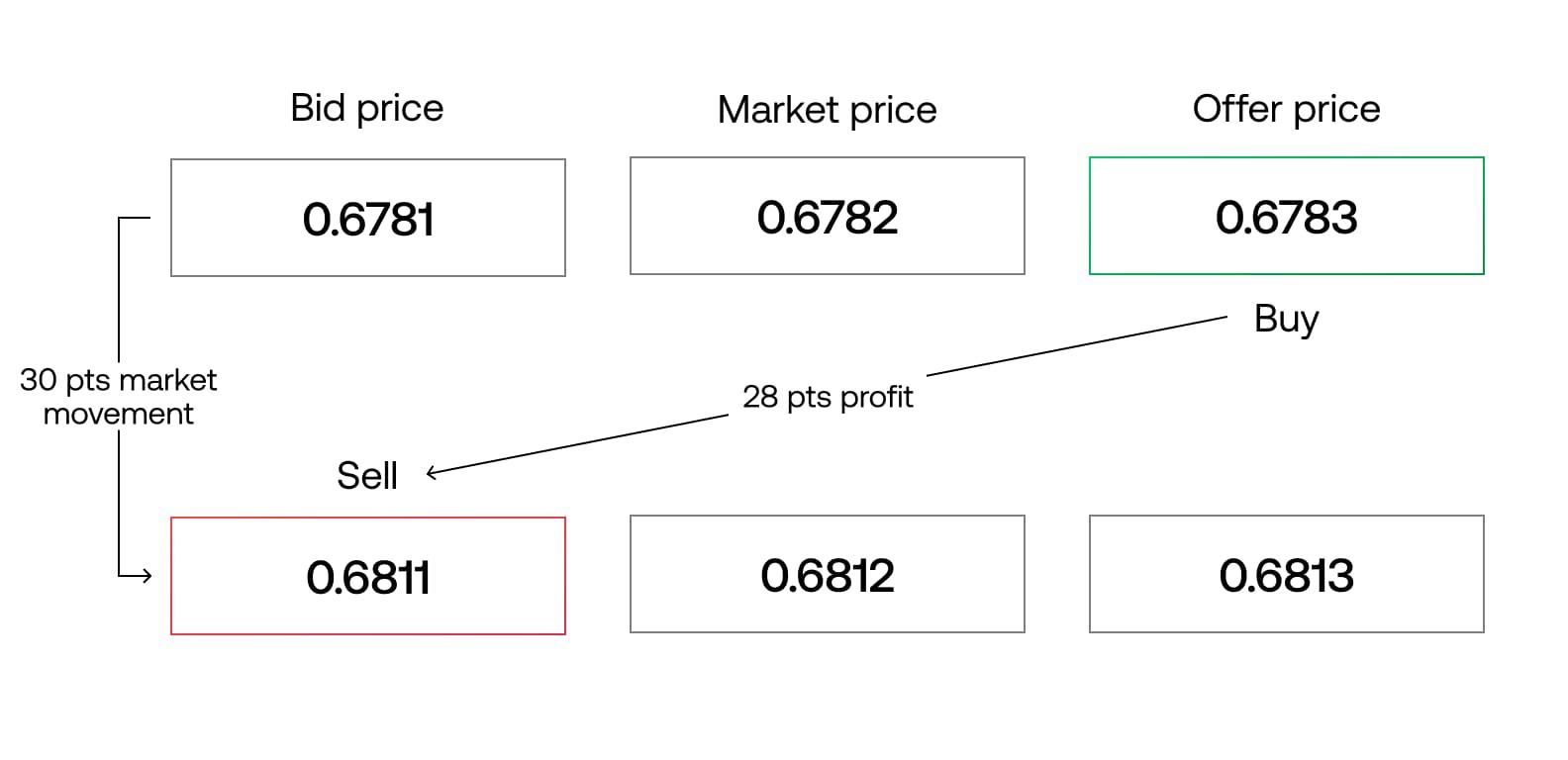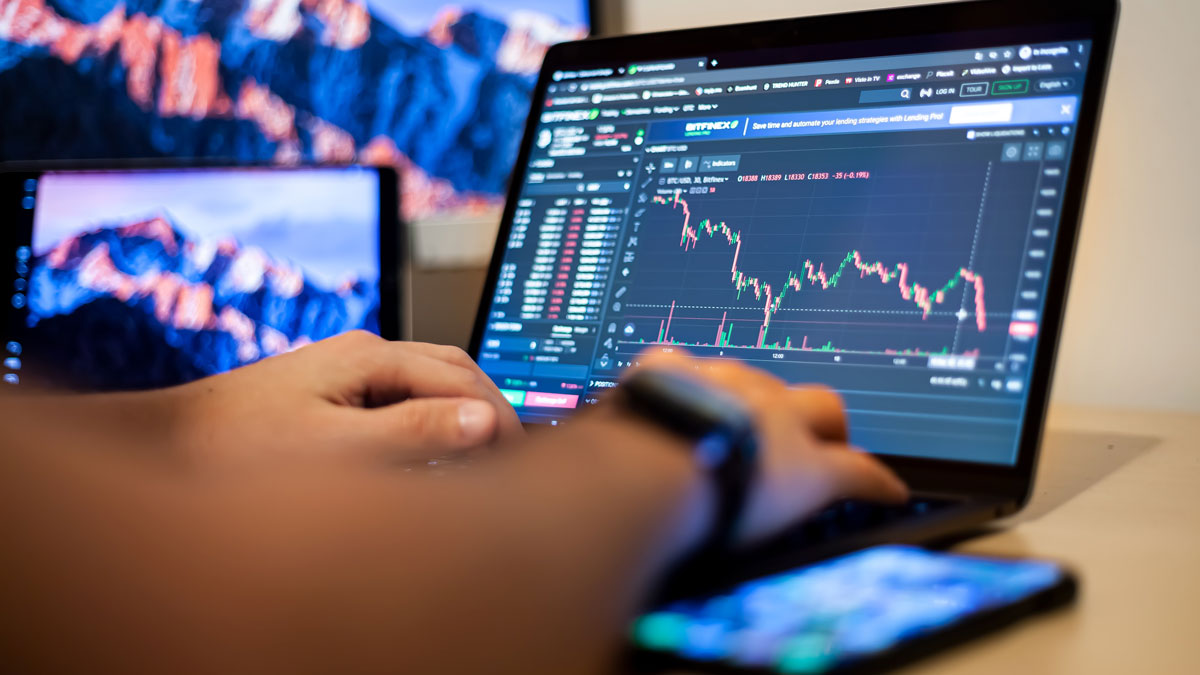

Finance
How Hard Is It To Learn Forex Trading
Published: December 22, 2023
Learn the ins and outs of Forex Trading with this comprehensive guide. Discover the secrets of the finance world and master the art of trading effectively.
(Many of the links in this article redirect to a specific reviewed product. Your purchase of these products through affiliate links helps to generate commission for LiveWell, at no extra cost. Learn more)
Table of Contents
- Introduction
- What is Forex Trading?
- The Basics of Forex Trading
- Factors to Consider before Starting Forex Trading
- The Learning Process of Forex Trading
- Common Challenges Faced by Beginner Forex Traders
- Effective Strategies for Learning Forex Trading
- Resources and Tools for Learning Forex Trading
- The Importance of Practice in Forex Trading
- Conclusion
Introduction
Welcome to the world of Forex trading! If you’re new to the financial markets, you may be wondering what Forex trading is all about and how hard it is to learn. In this article, we’ll explore the basics of Forex trading and delve into the learning process to help you understand the challenges and strategies involved.
Forex, short for foreign exchange, is the decentralized market where currencies are traded globally. It is the largest and most liquid market in the world, with trillions of dollars being exchanged every day. Forex trading allows individuals and institutions to speculate on the fluctuations in currency prices, aiming to profit from these movements.
Learning Forex trading can be an exciting and rewarding journey, but it does require a certain level of dedication and understanding. Many aspiring traders are drawn to the potential for significant profits, but it’s essential to approach Forex trading with a realistic mindset and a willingness to learn.
The key to success in Forex trading lies in understanding the fundamental principles and techniques involved. This includes studying economic indicators, analyzing charts and patterns, and developing effective strategies. While it may seem challenging at first, with the right resources and guidance, anyone can learn to navigate the Forex market.
Before diving into the learning process of Forex trading, it’s crucial to consider a few factors. Firstly, understanding your risk tolerance and financial goals is essential. Forex trading can be highly volatile, and it’s crucial to have a clear understanding of how much money you’re willing to risk and what you hope to achieve.
Next, it’s important to choose the right broker. A reputable and regulated broker will provide you with the necessary tools, educational resources, and a reliable trading platform to facilitate your learning process. Take the time to research and compare different brokers to find the one that best suits your needs.
Now that we’ve covered the basics and important considerations, let’s dive into the learning process of Forex trading. In the next section, we’ll explore the steps and resources that will help you acquire the necessary knowledge and skills to become a successful Forex trader.
What is Forex Trading?
Forex trading, also known as foreign exchange trading, is the process of buying and selling different currencies with the aim of making a profit. It is a decentralized market where currencies from all around the world are traded. The primary participants in the Forex market are banks, financial institutions, corporations, and individual traders.
The Forex market operates 24 hours a day, five days a week, allowing traders to engage in trading activities at any time. Unlike traditional stock markets, the Forex market does not have a physical location. Instead, trading is conducted electronically over-the-counter (OTC) through a global network of banks and financial institutions.
The main objective of Forex trading is to speculate on the fluctuations in currency prices and potentially make a profit. Traders aim to take advantage of the price differences between currency pairs, such as the EUR/USD or GBP/JPY. They buy a currency when they believe its value will increase in the future, and sell it when they anticipate a decline in value.
One of the key features of the Forex market is its high level of liquidity. Due to its massive trading volume, there is always a buyer and a seller for any given currency pair, ensuring that traders can enter and exit positions quickly. This liquidity also helps to keep transaction costs relatively low.
Another notable aspect of Forex trading is leverage. Leverage allows traders to control positions that are larger than their actual account balance. It amplifies both profits and losses, so while it can enhance potential gains, it also carries a higher level of risk.
Forex trading involves various currency pairs, each consisting of a base currency and a quote currency. The base currency is the currency being bought or sold, while the quote currency is the currency used to make the transaction. For example, in the EUR/USD currency pair, the euro is the base currency, and the US dollar is the quote currency.
Overall, Forex trading offers numerous opportunities for individuals to profit from the fluctuations in currency prices. However, it’s important to note that Forex trading involves risks and requires sufficient knowledge, skills, and experience. With proper education and a disciplined approach, anyone can learn to navigate the Forex market and potentially achieve their financial goals.
The Basics of Forex Trading
Before diving into the world of Forex trading, it’s essential to understand the key components and concepts that drive the market. Here are the basics of Forex trading:
- Currency pairs: In Forex trading, currencies are always traded in pairs. Each pair consists of a base currency and a quote currency. The base currency is the currency being bought or sold, while the quote currency is the currency used to make the transaction. For example, in the EUR/USD currency pair, the euro is the base currency, and the US dollar is the quote currency.
- Pips: Pips, short for “percentage in point,” are the smallest unit of measurement in the Forex market. They represent the change in the exchange rate between two currencies. Most currency pairs are quoted to the fourth decimal place, so a one-pip movement would be equivalent to a 0.0001 change in the exchange rate.
- Bid and Ask price: When trading Forex, you’ll encounter two prices: the bid price and the ask price. The bid price is the price at which you can sell the base currency, while the ask price is the price at which you can buy the base currency. The difference between the bid and ask price is known as the spread, which represents the cost of the trade.
- Long and Short positions: In Forex trading, you can take either a long or a short position. Going long means buying a currency pair with the expectation that its value will rise. Going short, on the other hand, involves selling a currency pair with the anticipation that its value will fall.
- Leverage: Leverage allows traders to control positions that are larger than their actual account balance. It is a double-edged sword, as it can magnify both profits and losses. For example, with a leverage of 1:100, you can control a position worth $10,000 with a deposit of just $100. However, it’s crucial to use leverage with caution and have a clear risk management strategy in place.
- Market analysis: In Forex trading, two main types of analysis are commonly used: technical analysis and fundamental analysis. Technical analysis involves studying chart patterns, trends, and indicators to predict future price movements. Fundamental analysis focuses on economic indicators, news events, and global factors that could affect currency prices.
These are some of the fundamental concepts that form the basis of Forex trading. It’s important to have a solid understanding of these concepts before diving into the market. Additionally, continuous learning and practice are necessary to develop the skills and strategies required to navigate the ever-changing Forex market.
Factors to Consider before Starting Forex Trading
Before venturing into Forex trading, it’s important to consider several factors that can significantly impact your success in the market. Here are some key considerations:
- Education and Knowledge: Forex trading requires a solid foundation of knowledge and understanding. Take the time to educate yourself about the market, including its mechanics, terminology, and fundamental principles. There are various online courses, tutorials, and educational resources available to help you gain the necessary knowledge.
- Risk Tolerance: Understand your risk tolerance before entering the Forex market. Forex trading involves inherent risks, and it’s crucial to be prepared for potential losses. Assess your financial situation, set clear risk management strategies, and only invest what you can afford to lose.
- Financial Goals: Clearly define your financial goals before getting started. Determine whether you’re trading for short-term gains or long-term wealth accumulation. Having a clear vision of what you want to achieve will help guide your trading decisions and keep you focused on your objectives.
- Time Commitment: Forex trading requires time and dedication. Assess how much time you can realistically commit to studying the market, analyzing charts, and executing trades. Forex trading can be a full-time profession or a part-time endeavor, depending on your personal goals and availability.
- Choosing a Reliable Broker: Selecting the right broker is crucial for your success in Forex trading. Look for a reputable broker that offers a user-friendly trading platform, competitive spreads, robust customer support, and a variety of educational resources. Ensure the broker is regulated by a respected financial authority.
- Access to Information: Stay informed about global economic events, news releases, and market trends. Economic indicators and news events can significantly impact currency prices. Utilize reliable sources of information and economic calendars to stay up-to-date with market-moving events.
- Psychological Factors: Forex trading can be emotionally challenging, especially during times of market volatility. Develop discipline, patience, and emotional control to avoid impulsive trading decisions driven by fear or greed. Maintain a positive mindset and approach trading with a realistic perspective.
- Practice and Testing: Before committing real money, practice trading strategies in a risk-free environment using demo accounts provided by brokers. This allows you to familiarize yourself with the trading platform and test different strategies without risking your capital. Regularly evaluate and refine your trading approach based on the results of your practice sessions.
By considering these factors before diving into Forex trading, you can set yourself up for a greater chance of success. Remember that Forex trading is a continuous learning process, and it’s important to stay curious, adaptable, and open to new strategies and techniques.
The Learning Process of Forex Trading
Embarking on the journey of learning Forex trading can be both exciting and challenging. Here are the key steps to help you navigate the learning process:
- Acquire the Basics: Start by familiarizing yourself with the fundamental concepts and terminology of Forex trading. Understand how currency pairs work, how to read price charts, and the key components of a trading platform. This knowledge forms the foundation for more advanced learning.
- Educate Yourself: Dive deeper into the world of Forex trading by seeking out educational resources. There are numerous books, online courses, webinars, and forums available to learn from experienced traders. Take advantage of these resources to learn about technical and fundamental analysis, risk management, and trading strategies.
- Develop a Trading Plan: Create a trading plan that outlines your trading goals, risk tolerance, and preferred trading strategies. A trading plan helps you stay disciplined and focused, enabling you to make objective trading decisions. As you gain experience, continuously refine and adapt your trading plan to align with your evolving needs and market conditions.
- Practice with Demo Accounts: Many Forex brokers offer demo accounts that allow you to practice trading in a risk-free environment using virtual funds. Utilize these demo accounts to familiarize yourself with the trading platform, test different strategies, and gain confidence in your trading abilities. Treat your demo trading as seriously as real trading to simulate actual market conditions.
- Study Market Analysis: Learn various methods of market analysis, including technical analysis and fundamental analysis. Technical analysis involves studying charts, patterns, and indicators to identify potential trading opportunities. Fundamental analysis requires understanding economic indicators, news releases, and geopolitical events that can impact currency prices. Expand your knowledge by studying different analysis techniques and finding what works best for you.
- Learn Risk Management: Develop a solid risk management strategy to protect your capital and minimize losses. This includes setting realistic profit targets, determining stop-loss levels, and using appropriate position sizing. Applying proper risk management techniques helps you preserve your trading account and survive through losing periods.
- Stay Updated: Stay informed about market news, economic indicators, and events that can impact currency prices. Follow financial news outlets, subscribe to economic calendars, and join Forex communities to stay updated. Continuously gather knowledge and insights to adapt your trading strategies accordingly.
- Seek Guidance and Mentorship: Consider finding a mentor or joining a trading community where you can learn from experienced traders. Engaging with other traders allows you to gain insights, ask questions, and benefit from their expertise. Surrounding yourself with a supportive community can accelerate your learning and provide guidance when needed.
- Embrace Continuous Learning: Forex trading is a never-ending learning journey. Stay curious and open-minded to new strategies, techniques, and market developments. Continuously educate yourself by reading books, attending webinars, and staying up-to-date with industry trends. The more you learn, the better equipped you’ll be to adapt to changing market conditions.
The learning process of Forex trading can be challenging but rewarding. It requires dedication, practice, and a willingness to learn from both successes and failures. By following these steps and maintaining a growth mindset, you can develop the skills and knowledge needed to navigate the intricacies of the Forex market.
Common Challenges Faced by Beginner Forex Traders
As a beginner in Forex trading, it’s important to be aware of the challenges that you may encounter along the way. Here are some common challenges faced by beginner Forex traders:
- Emotional Decision-Making: One of the biggest challenges for beginners is controlling emotions while trading. Fear and greed can lead to impulsive decision-making, resulting in poor trade execution. It’s important to develop emotional discipline and stick to your trading plan, regardless of market fluctuations.
- Lack of Knowledge: Forex trading involves acquiring a vast amount of knowledge and skills. Beginners often struggle with understanding technical analysis, fundamental analysis, and risk management. It takes time and practice to become proficient in these areas. Continuous learning is essential to overcome this challenge.
- Lack of Strategy: Many beginner traders jump into Forex trading without a well-defined strategy. They may make trades based on impulse or tips from others, leading to inconsistent results. Developing a robust trading plan with clear entry and exit criteria is crucial for long-term success.
- Overtrading: Beginner traders often fall into the trap of overtrading, making too many trades without proper analysis. They may become addicted to the excitement of trading or feel the need to constantly be in the market. Overtrading can lead to poor decision-making and unnecessary losses.
- Risk Management: Managing risk is a critical aspect of successful Forex trading. Beginner traders may struggle with determining appropriate position sizes, setting stop-loss levels, and calculating risk-to-reward ratios. Without proper risk management, losses can quickly deplete trading accounts.
- Market Volatility: The Forex market can be highly volatile, especially during economic news releases or geopolitical events. Volatility can lead to unexpected price movements and increased market noise, making it challenging for beginners to identify reliable trading opportunities. Adapting to market volatility requires experience and a deep understanding of market dynamics.
- Psychological Factors: Forex trading can be mentally and emotionally taxing. Beginners often face fear, doubt, and impatience, which can lead to poor decision-making. Maintaining a positive mindset, managing emotions effectively, and practicing discipline are key to overcoming psychological challenges.
- Choosing a Reliable Broker: Selecting a trustworthy and reliable Forex broker is crucial. Beginners may struggle to find a reputable broker that offers competitive spreads, a user-friendly platform, and reliable customer support. It’s important to conduct thorough research and choose a broker that aligns with your trading needs and priorities.
- Technology and Platform Familiarity: Getting accustomed to the trading platform and understanding how to execute trades effectively can be daunting for beginners. Navigating charts, placing orders, and using technical analysis tools may take time to learn. Spending time practicing on a demo account can help overcome this challenge.
- Patience and Persistence: Forex trading requires patience and persistence. Beginners often expect instant success and get discouraged by initial losses. It’s important to understand that becoming a proficient trader takes time and effort. Stay committed, learn from mistakes, and continually refine your trading strategies.
By acknowledging these common challenges and actively working to overcome them, beginner Forex traders can increase their chances of long-term success. Remember, perseverance, continuous learning, and proper risk management are key to navigating the complexities of Forex trading.
Effective Strategies for Learning Forex Trading
Learning Forex trading requires a structured and disciplined approach. Here are some effective strategies to enhance your learning process:
- Start with the Basics: Begin by building a solid foundation of Forex trading knowledge. Understand the key concepts, terminology, and mechanics of the market. This includes learning about currency pairs, pips, bid and ask prices, and different order types. Familiarize yourself with the basics before moving on to more advanced topics.
- Utilize Educational Resources: Take advantage of the various educational resources available. These include online courses, webinars, trading forums, and educational videos. Use reputable sources to learn technical analysis, fundamental analysis, and risk management. Continuously expand your knowledge and stay updated with market trends.
- Practice with Demo Accounts: Most Forex brokers offer demo accounts that allow you to practice trading with virtual money. Use these accounts to apply the knowledge you’ve acquired and test different trading strategies. Treat your demo trading as seriously as real trading, and analyze the results to identify strengths and weaknesses.
- Develop a Trading Plan: Create a clear and concise trading plan that outlines your goals, risk tolerance, and trading strategies. Your plan should include entry and exit criteria, risk management guidelines, and rules for trade execution. Following a well-defined plan helps eliminate emotional decision-making and promotes consistency in your approach.
- Focus on a Few Currency Pairs: Instead of trying to trade every currency pair, focus on a few that align with your trading style and strategy. Study their historical price movements, understand their correlations, and analyze related economic events. By specializing in a select number of currency pairs, you can develop a deeper understanding of their behavior.
- Study Price Charts: Technical analysis is a vital tool for Forex traders. Learn how to read price charts, identify patterns, and use technical indicators. Price action analysis and chart patterns can provide valuable insights into market trends and potential trading opportunities. Regularly analyze price charts and practice identifying patterns to enhance your skills.
- Follow Experienced Traders: Identify successful and experienced Forex traders and learn from their strategies and insights. Follow their blogs, social media accounts, or join trading communities where they share their knowledge. Observing how experienced traders analyze markets and execute trades can help you gain valuable insights and improve your decision-making.
- Keep a Trading Journal: Maintain a trading journal to track your trades and analyze your performance. Record your trade entries, exits, and the reasons behind your decisions. This enables you to review your trades objectively, identify patterns, and learn from your mistakes. Regularly reviewing your journal helps refine your trading strategies and improve your decision-making.
- Practice Risk Management: Effective risk management is essential for long-term success. Learn about position sizing, setting stop-loss orders, and calculating risk-to-reward ratios. Implement strict risk management guidelines in your trading plan to protect your capital and minimize losses. Proper risk management is crucial to preserve your trading account and ensure consistency.
- Learn from Your Mistakes: Don’t be discouraged by losses or mistakes. Every trader goes through ups and downs. Instead, view your mistakes as learning opportunities. Analyze your losing trades to understand what went wrong and adjust your approach accordingly. Continuous learning and improvement are key to becoming a better Forex trader.
Implementing these strategies will help you structure your learning process and develop a strong foundation in Forex trading. Remember to be patient and persistent. Forex trading is a skill that takes time, practice, and dedication to master. Stay committed to your learning journey, continuously refine your techniques, and remain adaptable to changing market conditions.
Resources and Tools for Learning Forex Trading
When it comes to learning Forex trading, there are numerous resources and tools available to help you enhance your knowledge and skills. Here are some valuable resources to consider:
- Online Courses and Educational Platforms: Many online platforms offer comprehensive Forex trading courses taught by experienced traders. These courses cover everything from the basics of Forex trading to advanced technical analysis and strategies. Look for courses that provide a structured curriculum, interactive lessons, and ongoing support for optimal learning.
- Trading Books and eBooks: A multitude of books and eBooks are available on Forex trading, written by renowned traders and experts in the field. These books cover a wide range of topics, including technical analysis, fundamental analysis, trading psychology, and risk management. Reading books allows you to learn from experienced traders and gain unique perspectives.
- Webinars and Online Workshops: Attend webinars and online workshops conducted by professional traders and market analysts. These live events provide a valuable opportunity to learn directly from experts, ask questions, and gain insights into their trading strategies. Webinars often cover specific topics or techniques, allowing for in-depth knowledge acquisition.
- Demo Accounts: Practice trading using demo accounts provided by Forex brokers. These accounts allow you to simulate real-market conditions and execute trades without risking your capital. Utilize demo accounts to familiarize yourself with trading platforms, try out different strategies, and gain confidence in your trading abilities.
- Financial News Outlets: Stay updated with financial news outlets that cover global markets. Websites, news channels, and financial publications provide real-time market news, economic indicators, and analysis that can impact currency prices. By staying informed, you’ll be aware of market events and their potential implications on your trading decisions.
- Trader Forums and Social Media: Engage with other traders in online forums, social media groups, and trading communities. These platforms allow you to interact with like-minded individuals, discuss trading strategies, and seek guidance from experienced traders. Participating in trader forums can provide valuable insights and a sense of community.
- Trading Platforms and Tools: Utilize trading platforms that offer advanced charting tools, technical indicators, and real-time market data. These platforms allow you to analyze price charts, identify patterns, and develop trading strategies. Additionally, there are third-party tools and plugins available that can enhance your trading experience by providing additional indicators and analysis.
- Forex Blogs and Podcasts: Follow Forex blogs and listen to podcasts hosted by experienced traders. These resources often provide valuable insights, market analysis, and trading tips. By regularly following blogs and podcasts, you can stay updated with market trends while learning from the experiences of successful traders.
- Market Simulators: Use market simulators or trading simulators to practice trading strategies in a simulated environment. These simulators provide real-time market data and allow you to place simulated trades without risking real money. They are valuable tools for refining your skills, testing new strategies, and gaining practical experience.
- Mentorship Programs: Consider joining mentorship programs or finding a trading mentor who can guide you through your learning process. Mentors can provide personalized guidance, help you navigate challenges, and provide valuable feedback on your trading approach. Mentorship programs often involve one-on-one coaching sessions, access to exclusive resources, and ongoing support.
These resources and tools serve as valuable assets for your Forex trading education. Remember to approach your learning journey with curiosity, persistence, and a willingness to continuously improve. Consistently utilizing these resources will help you strengthen your understanding of Forex trading and enhance your trading skills.
The Importance of Practice in Forex Trading
Practice plays a crucial role in mastering any skill, and Forex trading is no exception. Here’s why practice is essential in Forex trading:
1. Gaining Experience: The more you practice trading, the more experience you gain. This experience allows you to familiarize yourself with the market dynamics, understand price movements, and develop a feel for entry and exit points. Practice helps you refine your decision-making process and build confidence in your trading abilities.
2. Testing Trading Strategies: Practice provides a platform to test and fine-tune your trading strategies. By executing trades in a risk-free environment, such as a demo account, you can gauge the effectiveness of different strategies, analyze their outcomes, and make necessary adjustments. This iterative process helps you identify what works best for your trading style and increases your chances of success in live trading.
3. Building Discipline: Consistent practice helps cultivate discipline, a critical attribute for successful Forex trading. Following a trading plan, adhering to risk management techniques, and executing trades based on predetermined rules require discipline. Through practice, you develop the self-control and emotional resilience necessary to stick to your plan even during challenging market conditions.
4. Understanding Market Behavior: Practice allows you to observe and understand the behavior of currency pairs and the Forex market as a whole. You can study price charts, identify patterns, and analyze the impact of economic news releases. By practicing, you become familiar with market patterns and gain insights into how different factors affect currency prices.
5. Developing Quick Decision-Making Skills: The Forex market operates at a fast pace, requiring traders to make quick decisions. Frequent practice enables you to develop the ability to analyze market conditions swiftly and make informed trading decisions under time constraints. Practicing decision-making in various market scenarios helps sharpen your skills and enables you to react effectively to real-time market changes.
6. Fine-tuning Risk Management: Effective risk management is paramount in Forex trading. Practice allows you to experiment with different risk management techniques, such as position sizing, setting stop-loss orders, and determining risk-to-reward ratios. Through practice, you learn to strike a balance between profit potential and risk exposure, ensuring the survival and long-term success of your trading activities.
7. Overcoming Psychological Challenges: Forex trading can evoke strong emotions, such as fear, greed, and uncertainty. Practicing trading under different market conditions helps you understand and manage these emotions effectively. It allows you to develop resilience, maintain a disciplined mindset, and avoid impulsive decision-making driven by emotions.
8. Continuous Learning: Practice goes hand in hand with continuous learning. As you practice, you identify areas where further education and improvement are needed. This prompts you to seek additional knowledge, explore new trading strategies, and stay updated with market trends. The learning process becomes more meaningful when applied to real or simulated trading scenarios.
Remember that practice should be approached with the same level of commitment and discipline as live trading. Treat your practice sessions seriously, use them to simulate real-life trading conditions, and focus on refining your skills and strategies. The knowledge and experience gained through practice will greatly contribute to your success as a Forex trader.
Conclusion
Forex trading can be an exciting and potentially rewarding endeavor, but it requires a commitment to learning and continuous improvement. By understanding the fundamentals of Forex trading, considering important factors before starting, and implementing effective learning strategies, you can lay a solid foundation for your trading journey.
Learning Forex trading involves acquiring knowledge and skills through various resources and tools. Online courses, books, webinars, demo accounts, and market simulators offer valuable opportunities to gain practical experience and enhance your understanding of the market. It’s important to stay updated with financial news, follow experienced traders, and engage with trading communities to foster growth and learning.
Practice is a critical component of becoming a successful Forex trader. Through practice, you gain experience, refine your strategies, develop discipline, and gain a deeper understanding of market behavior. Utilizing demo accounts, testing different trading techniques, and continuously improving your risk management skills contribute to your long-term success.
Remember that Forex trading involves inherent risks, and losses are inevitable along the way. It’s important to have realistic expectations, manage your risk effectively, and continually learn from your successes and failures. Adopting a patient and disciplined mindset, along with a growth-oriented approach, will help you navigate the challenges that arise in the Forex market.
In conclusion, Forex trading can offer significant opportunities for those willing to invest the time and effort into learning and practicing. By combining knowledge, experience, and a disciplined approach, you can work towards becoming a skilled Forex trader. Stay dedicated, adapt to changing market conditions, and never stop expanding your understanding of the Forex market. With persistence and continuous improvement, you have the potential to achieve your financial goals in the exciting world of Forex trading.














